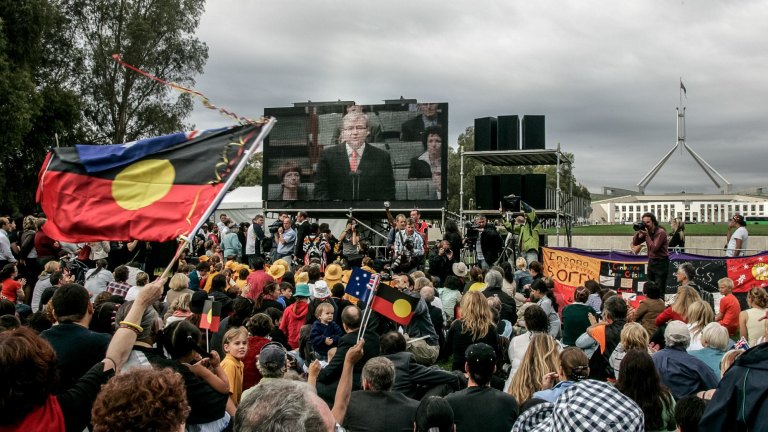Anniversary of the National Apology to the Stolen Generations
Aboriginal and Torres Strait Islander readers are advised that the following article may contain images and voices of people who have passed away.

Thousands gathered outside Australia's parliament in 2008 to witness the historic speech. Courtesy of Sydney Morning Herald, 2008.
Each year, February 13th marks the anniversary of the National Apology to the Stolen Generations. In 2008, then-Prime Minister Kevin Rudd delivered a speech, that was broadcasted nationwide, apologising on behalf of the Australian Government to the Aboriginal and Torres Strait Islander peoples who as children were forcibly removed from their families and communities by the laws and policies of successive Australian Parliaments and governments. These damaging laws and policies were aimed at assimilating the Aboriginal and Torres Strait Islander population into the predominantly white Australian community (National Indigenous Australians Agency, 2022).
The National Apology was a direct response to Recommendation 5a of the “Bringing them Home: the Report of the National Inquiry into the Separation of Aboriginal and Torres Strait Islander Children from Their Families” report. The statistics from the “Bringing Them Home” report estimated that the children of the Stolen Generations made up 10 - 33% of all Indigenous children between 1910 and the 1970s. Further, one in three Indigenous children were taken and placed in institutions and foster care, where many suffered neglect and abuse and were compelled to reject their Indigenous heritage, family and community. Although this report was tabled in Parliament on May 26th of 1997, it took over a decade for the survivors of the Stolen Generations to actually receive a formal acknowledgement and apology from the Australian government (National Indigenous Australians Agency, 2022).In this landmark speech, Prime Minister Kevin Rudd acknowledged the grief, suffering and loss inflicted upon Aboriginal and Torres Strait Islander peoples, and called upon all Australians to reflect on the past actions that form this “blemished chapter in our nation's history.” The apology also included the desire to embrace new solutions to enduring problems where old approaches had failed, and a future based on mutual respect and mutual responsibility.
Many survivors of the Stolen Generations were present in the Chamber, the Great Hall of Parliament House and the lawns outside of Parliament to witness the historic National Apology. Australians, Indigenous and non-Indigenous alike, also gathered in the thousands at public spaces to watch the apology across the country, reacting with tears and feelings of triumph and relief.
It is important to note that even today, many victims of the Stolen Generations are still coming to terms with the trauma and loss they’ve experienced. The CEO of the government-funded Stolen Generations’ survivors group the Healing Foundation, Fiona Petersen, has perfectly summed up the importance of commemorating the date of the National Apology:“We commemorate the apology to keep the spirit of its words and their meaning alive. The commemoration is a very real part of the healing journey. One that encourages us to keep looking for new ways to work together for genuine change in the lives of our survivors and their descendants.”
How to Observe National Apology Day
The Healing Foundation, Australian Institute of Aboriginal and Torres Strait Islander Studies and Reconciliation Australia have a plethora of resources and information as to the history of the Stolen Generations and stories from its victims. We recommend visiting these websites if you are wanting to do some research to educate yourself or raise awareness about the day.
This day is also one to celebrate distinguished First Nations Australians in various fields, such as art, entertainment, sports and academics, who have significantly contributed to the history, accomplishments and development of Australia.
Another way to observe National Apology Day is to speak up against discriminatory laws and policies made by governments against the fundamental human rights of many First Nations peoples around the globe. The day provides ample opportunity to raise awareness about these injustices and to encourage people to educate themselves on the discriminative, unjust histories of different nations across the world.






